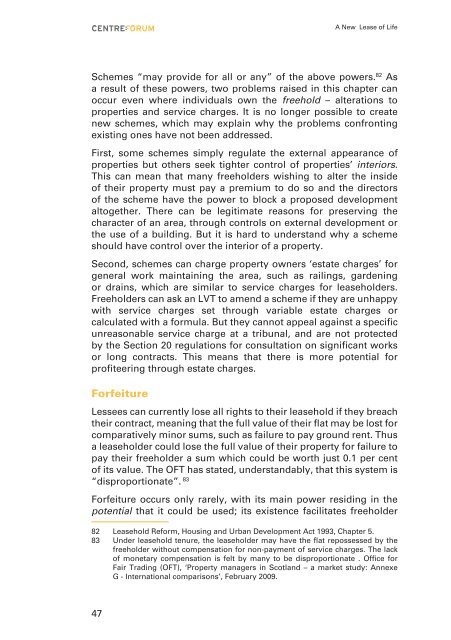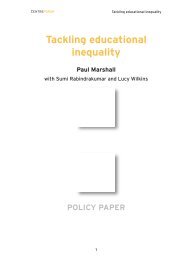A new lease of life: - CentreForum
A new lease of life: - CentreForum
A new lease of life: - CentreForum
You also want an ePaper? Increase the reach of your titles
YUMPU automatically turns print PDFs into web optimized ePapers that Google loves.
A New Lease <strong>of</strong> LifeSchemes “may provide for all or any” <strong>of</strong> the above powers. 82 Asa result <strong>of</strong> these powers, two problems raised in this chapter canoccur even where individuals own the freehold – alterations toproperties and service charges. It is no longer possible to create<strong>new</strong> schemes, which may explain why the problems confrontingexisting ones have not been addressed.First, some schemes simply regulate the external appearance <strong>of</strong>properties but others seek tighter control <strong>of</strong> properties’ interiors.This can mean that many freeholders wishing to alter the inside<strong>of</strong> their property must pay a premium to do so and the directors<strong>of</strong> the scheme have the power to block a proposed developmentaltogether. There can be legitimate reasons for preserving thecharacter <strong>of</strong> an area, through controls on external development orthe use <strong>of</strong> a building. But it is hard to understand why a schemeshould have control over the interior <strong>of</strong> a property.Second, schemes can charge property owners ‘estate charges’ forgeneral work maintaining the area, such as railings, gardeningor drains, which are similar to service charges for <strong>lease</strong>holders.Freeholders can ask an LVT to amend a scheme if they are unhappywith service charges set through variable estate charges orcalculated with a formula. But they cannot appeal against a specificunreasonable service charge at a tribunal, and are not protectedby the Section 20 regulations for consultation on significant worksor long contracts. This means that there is more potential forpr<strong>of</strong>iteering through estate charges.ForfeitureLessees can currently lose all rights to their <strong>lease</strong>hold if they breachtheir contract, meaning that the full value <strong>of</strong> their flat may be lost forcomparatively minor sums, such as failure to pay ground rent. Thusa <strong>lease</strong>holder could lose the full value <strong>of</strong> their property for failure topay their freeholder a sum which could be worth just 0.1 per cent<strong>of</strong> its value. The OFT has stated, understandably, that this system is“disproportionate”. 83Forfeiture occurs only rarely, with its main power residing in thepotential that it could be used; its existence facilitates freeholder82 Leasehold Reform, Housing and Urban Development Act 1993, Chapter 5.83 Under <strong>lease</strong>hold tenure, the <strong>lease</strong>holder may have the flat repossessed by thefreeholder without compensation for non-payment <strong>of</strong> service charges. The lack<strong>of</strong> monetary compensation is felt by many to be disproportionate . Office forFair Trading (OFT), ‘Property managers in Scotland – a market study: AnnexeG - International comparisons’, February 2009.47





